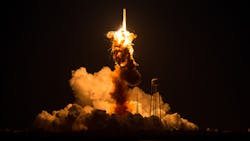Orbital Set for First Space Cargo Mission Since 2014 Explosion
MIAMI — Orbital ATK counted down to its first space launch since a sudden explosion last year destroyed its Antares rocket and cargo craft bound for the International Space Station.
Thursday’s planned liftoff of the unmanned Cygnus cargo ship uses a different rocket — an Atlas V made by United Launch Alliance — and is scheduled for 5:55 p.m. local time. The weather forecast for launch was 60% favorable, NASA’s weather officer said.
Orbital executives denied any jitters, more than a year after the blastoff at Wallops Island, Va.
“We feel extremely confident or we wouldn’t be sitting on top of that rocket right now,” Frank Culbertson, president of the Space Systems Group at Orbital ATK, told reporters. “We tend not to be melodramatic about those things.
“Right now we are focused on the success of this mission and getting the cargo to the space station. Very optimistic.”
In October 2014, an Orbital rocket packed with thousands of pounds of supplies exploded seconds after takeoff, marking the first catastrophic failure since private companies began resupplying the orbiting outpost in 2010.
It was followed eight months later by a SpaceX rocket explosion, and the consecutive accidents effectively shut off the flow of U.S. supplies to astronauts in orbit. A Russian Progress ship was also lost after launch in April, but International Space Station program managers said the astronauts were never in danger and still have several months of supplies in storage.
Orbital has a $1.9 billion contract with NASA — and SpaceX has a contract worth $1.6 billion — to send food and equipment to the research lab over a series of supply trips. Thursday’s launch is Orbital’s fourth scheduled mission to the International Space Station.
Orbital arranged to use United Launch Alliance’s Atlas V rocket while it upgrades its Antares rocket, which failed due to a problem with its reconditioned Ukrainian engine.
The company said after the accident that a control operator detected a suspected rocket engine failure, and the rocket was purposefully detonated to prevent damage to people in the area. The blast cost Orbital at least $200 million in lost equipment and supplies.
This time around, the cargo ship is packed with more supplies than a Cygnus has ever carried, amounting to some 7,300 pounds, company officials said. Sophisticated science experiments, ready-made food, a jet pack for spacewalking astronauts and even a satellite made by elementary school students are all on board.
If the launch goes ahead as planned Thursday, the spacecraft will arrive at the space station on December 6.
By Kerry Sheridan
Copyright Agence France-Presse, 2015
About the Author
Agence France-Presse
Copyright Agence France-Presse, 2002-2025. AFP text, photos, graphics and logos shall not be reproduced, published, broadcast, rewritten for broadcast or publication or redistributed directly or indirectly in any medium. AFP shall not be held liable for any delays, inaccuracies, errors or omissions in any AFP content, or for any actions taken in consequence.
